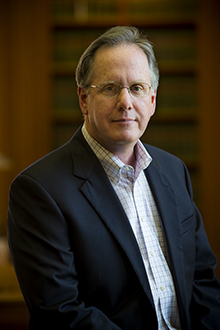Law professor pens book on presidential war powers

Stephen Griffin, an expert in constitutional law, says the Constitution is not meeting the challenges of a post-9/11 world. (Photo by Paula Burch-Celentano)
The three-year project culminated last month with the release of Long Wars and the Constitution, a comprehensive exploration of presidential war decisions from 1945 to the present. Published by Harvard University Press, the book explores the debate over the “imperial presidency” and concludes that the U.S. Constitution is not meeting the challenges of a post-9/11 world.
The Constitution requires the consent of Congress before the United States can go to war. Yet Griffin argues that ever since President Harry S. Truman chose to fight in Korea without gaining that consent, foreign policy has been jeopardized.
“The departure from the Constitution caused bad policy making on the part of nearly all subsequent presidents,” Griffin says. “And the reason we've gotten bad policy in war is because of the imbalance (of power).”
Griffin says, “This is a book about presidents and their decisions for major wars â“ major conventional wars and covert wars. I concentrate on major wars Korea, Vietnam, the Persian Gulf War, Afghanistan and Iraq and I also look at how nuclear strategy has affected that decision making.”
Griffin makes clear that he does not blame any single president; rather, both the executive and the legislative branches are at fault. He argues for beginning a cycle of accountability in which Congress plays a meaningful role in decisions on war.
“The fault lies on both ends of Pennsylvania Avenue,” Griffin says. “But the balance has to be fixed at the Congressional end. Congress needs to change the way it does business.”
